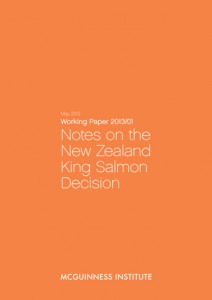 Today the McGuinness Institute issued a media release announcing the publication of Working Paper 2020/01: Notes on the New Zealand King Salmon Decision. The release also raises five key questions we believe remain unanswered following the Board of Inquiry hearing into the New Zealand King Salmon proposal.
Today the McGuinness Institute issued a media release announcing the publication of Working Paper 2020/01: Notes on the New Zealand King Salmon Decision. The release also raises five key questions we believe remain unanswered following the Board of Inquiry hearing into the New Zealand King Salmon proposal.
See below for full media release.
MCGUINNESS INSTITUTE MEDIA RELEASE 23 MAY 2020
Many questions remain unanswered in New Zealand King Salmon case
McGuinness Institute working paper reviews RMA processWendy McGuinness, Chief Executive of the McGuinness Institute, believes resource management processes are not up to the standard New Zealanders expect and deserve.
Ahead of next week’s High Court appeal hearing, the McGuinness Institute is pleased to announce the publication of Working Paper 2020/01: Notes on the New Zealand King Salmon Decision, which seeks to examine the public policy challenges and opportunities that arise from the New Zealand King Salmon’s application to establish additional salmon farms in the Marlborough Sounds. The McGuinness Institute is not a party in the upcoming High Court appeal in Blenheim next week.
McGuinness says ‘this case is incredibly important for the future of resource management in New Zealand. As the first commercial agricultural-based application to be considered under national significance, this is a landmark case that should be seen as a valuable opportunity to review and improve the process.’ McGuinness, who submitted on behalf of the Institute and participated as an economic expert in the Board of Inquiry hearing, believes that ‘the current system gives the applicant too much control over the process and the Board of Inquiry too little – the EPA must rigorously scrutinise applications and the Board of Inquiry must inquire.’
For McGuinness, five key questions remain unanswered:
Question 1: Why was the purpose of the application not inquired into? The stated purpose of NZKS’s application was to urgently acquire new water space to meet demand; however, existing production was well below full capacity (e.g. feed discharged on existing farms was almost half the amount presently allowed) and the company’s finished goods had doubled. (See Notes 3, 11 [Table 5] and 16 in the Working Paper)
Question 2: Why did the initial application contain so many errors? (See Note 4)
Question 3: Whose responsibility is it to ensure relevant reports commissioned by government departments are made available to the Board of Inquiry? Three relevant reports were not tabled. (See Note 1)
Question 4: Why was no comprehensive cost-benefit-analysis undertaken? (See Note 7: (ii))
Question 5: Why were the benefits of all nine farms assessed as a whole (rather than farm by farm) when
the costs and risks were largely assessed farm by farm? (See Note 11)
‘We hope that the current Ministry for the Environment review of the Resource Management Act will provide an opportunity to broadly answer these questions so New Zealanders can be confident future applications will be considered in a more robust and inquiring manner,’ says McGuinness.
The Institute is also hopeful that as a result of this decision, local authorities will ensure their long-term plans and regional policy statements are up to date and clearly reflect the wishes of the community, particularly when it comes to prohibited activities. In this case, the Marlborough District Council’s Regional Policy Statement (2020) was out of date and vague; the Board noted it offered only a ‘limited degree of guidance’.
The working paper provides background notes and more detailed analysis to support Think Piece 16: New Zealand King Salmon: Was it a good decision for New Zealand? published in March 2020. The Institute is confident these two documents will be useful to planners, lawyers, councillors, future applicants, economists and policy analysts interested in gaining a deeper understanding of this case. The think piece and working paper are available on the Institute’s website (www.mcguinnessinstitute.org) or hard copies can be purchased from the Institute’s online store.
[ENDS]
Brief context: In 2020 the New Zealand King Salmon Co. Limited applied to establish nine new salmon farms in the Marlborough Sounds. Following a hearing in 2020 the Board of Inquiry approved four of the nine farms with conditions.
About the McGuinness Institute: The McGuinness Institute is a non-partisan think tank working towards a sustainable future, contributing strategic foresight through evidence-based research and policy analysis. The Institute’s overarching project, Project 2058, aims to explore New Zealand’s long-term future and develop an appropriate national sustainable development strategy. Along the way we have identified areas of research interest such as a talent-based economy, genetic modification, the use and protection of our ocean, and resource management.
Useful links on the NZKS proposal:
McGuinness Institute – http://mcguinnessinstitute.org/Site/Project/One_Ocean/Salmon.aspx
EPA – http://www.epa.govt.nz/Resource-management/king-salmon/Pages/default.aspx
NZKS – http://kingsalmon.co.nz/application-for-additional-water-space/index.html
For further information please contact:
Wendy McGuinness
Chief Executive
McGuinness Institute
+64 4 499 8888
[email protected]





















![20160906 McGuinness Institute - TacklingPovertyNZ Workshop – Far North Flyer [FINAL]](/wp-content/uploads/20160906-McGuinness-Institute-TacklingPovertyNZ-Workshop-%E2%80%93-Far-North-Flyer-FINAL-1-50x50.png)
2 comments
Annie says:
May 28, 2020
“We must plant the sea and herd its animals using the sea as farmers instead of hunters. That is what civilization is all about – farming replacing hunting.”
Jacques Yves Cousteau
Shall we turn back to decimating wild stocks?
Calum says:
May 29, 2020
I have just wasted I reckon about 2 hours of my life reading this “working paper”. This private company (oh sorry “think tank”) and its CEO clearly have such a personal bias, the whole report is spent justifying Wendy’s personal opinions in this matter. Personally I like regional jobs and it really hacks me off when some ivory tower dwelling “know-it-all” interferes in the future job prospects of my community! NZ is all about primary production – when people stop going on global tourism jaunts (which they are stopping…) they will still want to buy NZ food. Forget so-called “eco-tourism” (which is fossil fuel use for no real production) and lets concentrate on primary production – and really when you look at it like an adult a few more hectares of production is nothing….